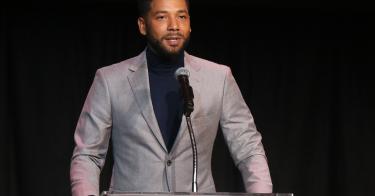What’s the moral of the Jussie Smollett case? Simply this: A culture that rewards victimhood status will produce an ever-growing number of victims.
It’s basic economics, really: You get more of what you subsidize and less of what you tax.
Smollett was indicted Wednesday and arrested and arraigned Thursday on a felony charge of filing a false police report.
The successful actor, who is black and gay, had claimed he was attacked by two white men who yelled racial and homophobic epithets, hung a noose around his neck, and poured a liquid on him that he said he thought was bleach.
His attackers, Smollett said, also shouted, “This is MAGA country,” referring to President Donald Trump’s “Make America Great Again” slogan.
Police located two brothers from Nigeria who say the actor paid them to carry out the staged attack. Police said Smollett’s motive was that he thought he wasn’t being paid enough for his role in the hit TV show “Empire.”
Smollett denies this version of events and is entitled, like all Americans, to the presumption of innocence.
A claim of an attack such as this, if false, is doubly troubling. Not only does it mean a waste of police resources, but it makes real claims harder to believe.
Unfortunately, it is no longer outrageous to believe that even someone rich and famous would file a false report of this sort. Today, victimhood is confused with virtue and has become a status symbol. What sociologists Bradley Campbell and Jason Manning call “victimhood culture” is becoming hardwired into everyday America.
Under this regime, Campbell and Manning write, victimization becomes “a way of attracting sympathy, so rather than emphasize either their strength or inner worth, the aggrieved emphasize their oppression and social marginalization … People increasingly demand help from others, and advertise their oppression as evidence that they deserve respect and assistance.”
Assistance in this case may mean actual benefits, such as easier admission to a university because of victimhood status.
But it’s not just potential rewards that make the number of people claiming victimhood status multiply. The way failure is interpreted under victimhood culture also tips the balance toward an ever growing number of victims in society.
For decades now, leftist activists have fought to ascribe lack of success to “structural discrimination” rather than lack of individual effort.
In an extensive, Ford Foundation-funded study on Mexican-Americans published in 1970, UCLA researchers were baffled and frustrated that their subjects interpreted their reversals as setbacks that were remediable through individual action and felt no need for group mobilization.
The lived experience of this group, they wrote, had produced “a long and bitter controversy among middle-class Mexican-Americans about defining the ethnic group as disadvantaged by any other criterion than individual failures.”
This was the time when the foundations of victimhood culture were first being laid, and activists understood that resentment was a powerful bonding agent. They therefore had to convince a proud people who had been in the Southwest for generations that they were and would always be targets of invidious, racially based discrimination unless they mobilized as a group.
This was a task made all the harder, however, by the fact that, according to the UCLA researchers, even among those Mexican-Americans who had experienced discrimination, “quite a few … fail to generalize their resentment about it, but continue to particularize incidents.”
Decades later, Campbell and Manning describe the problem this way:
The moral status conferred by victimhood is evident in how social scientists describe and explain those they view as victims, leading them to engage in a kind of ‘blame analysis’ in which they reject any theories that ‘blame’ designated victims by attributing to them any causal role in their predicament.
Campbell and Manning write that today’s grievance culture emerges in societies, like today’s, which lack ethnic homogeneity. But that may be putting the cart before the horse.
Perhaps the national sense that “we’re all in this together” breaks down when we relentlessly instill a consciousness of ethnic-based grievances; when we construct identity groups on the idea that they have no individual agency.
There is no glee to be had by any political side in the Jussie Smollett affair.
If the police charges turn out to be true, we can at least learn something from this sorry affair. A culture that rewards victimhood produces ever more self-proclaimed victims, and ever fewer individuals willing to try to overcome adversity through individual effort.
This piece originally appeared in The Daily Signal




